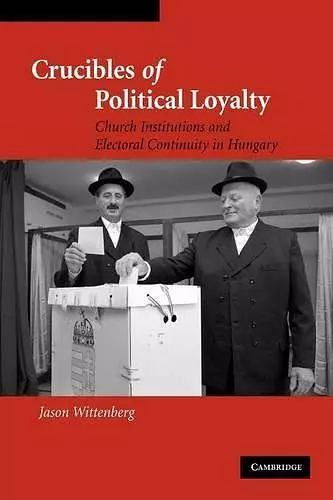Crucibles of Political Loyalty
Church Institutions and Electoral Continuity in Hungary
Format:Paperback
Publisher:Cambridge University Press
Published:19th Jul '12
Currently unavailable, and unfortunately no date known when it will be back
This paperback is available in another edition too:
- Hardback£90.00(9780521849128)

This book explores Hungary's path from pre- to post-communism, drawing on archival materials and an original election database.
This book investigates one of the oldest paradoxes in political science: why do mass political loyalties persist even amid prolonged social and economic upheaval? Drawing on archival materials and an original election database, this book explores this question by examining Hungary's path from pre- to post-communism.This book investigates one of the oldest paradoxes in political science: why do mass political loyalties persist even amid prolonged social upheaval and disruptive economic development. Drawing on extensive archival research and an original database of election results, this book explores the paradox of political persistence by examining Hungary's often tortuous path from pre- to post-communism. Wittenberg reframes the theoretical debate, and then demonstrates how despite the many depredations of communism, the Roman Catholic and Calvinist Churches transmitted loyalties to parties of the Right. Contrary to conventional wisdom, Church resistance occurred not from above, but from below. Hemmed in and harassed by communist party cadres, parish priests and pastors employed a variety of ingenious tactics to ensure the continued survival of local church institutions. These institutions insulated their adherents from pressures to assimilate into the surrounding socialist milieu. Ultimately this led to political continuity between pre- and post-communism.
"Wittenberg weighs in on a long-standing puzzle: Why, like a watermark on the printed page, do partisan loyalties survive within a society across generations and notwithstanding vast historical change -- in France, for example, from back across the Fifth, Fourth, and Third Republics, back even to the French Revolution, and maybe before? ...This is a rigorous explanation for a hard case, with relevance for other authoritarian transitions..." Robert Levgold, Foreign Affairs
“Jason Wittenberg’s study of the relationship between religiosity and voting practices in Hungary since the Second World War is an impressive attempt to bridge the methodological divide in the social sciences between number-crunching and narration...A formidable piece of scholarship and a highly stimulating spur to further research. It asks probing questions and includes keen observations, and it is to be hoped that political scientists as well as other scholars will continue to deploy a broad methodological arsenal to follow up on them.” James Bjork, H-Net Reviews
"Political scientists have long claimed that some public attitudes are surprisingly durable in the face of significant political, economic and social change and even when well-established regimes are dedicated to their eradication. However, the evidence for such claims is usually spotty; attitudes are rarely linked to behavior; and the mechanisms of reproduction are usually under-specified. Jason Wittenberg's careful analysis of local political struggles over the course of Hungary's transitions to both communism and postcommunism is a welcome exception to these generalizations. He provides strong evidence not just of the durability of public beliefs and their linkages to political behavior, but also the processes by which these beliefs and behaviors maintain themselves through the passage of time and in an unusually hostile political environment." Valerie Bunce, Cornell University
"Methodologists extol the merits of combining quantitative and qualitative methods, but serious analyses taking such advice are rare. This book is a wonderful exemplar of what can be learned from combining the two methods. The puzzle of why pre-Communist political cleavages manifested themselves again in post-Communist Hungary, as if 40 years of Communist rule did not matter, is both important and fascinating. The answer in terms of church institutions is equally important. Wittenberg's marshalling of different types of evidence makes the answer compelling." Nathaniel Beck, New York University
"Where the Catholic and Calvinist Churches outsmarted the Communist Party, Jason Wittenberg's compelling study shows, right wing voting in Hungary reemerged even after a half-century of rapid modernization and authoritarian rule. Wittenberg's stunning combination of archival discovery and statistical savvy makes this methodologically sophisticated book a veritable page-turner." David D. Laitin, Stanford University
"Wittenberg has successfully mixed a reading of the everyday party documents with a cutting-edge study of voting patterns to produce a convincing overall work. It is one of a few, and certainly one of the best, works on the persistence of political loyalties in authoritarian societies." Roger Petersen, Massachusetts Institute of Technology
ISBN: 9781107404847
Dimensions: 229mm x 152mm x 18mm
Weight: 460g
312 pages